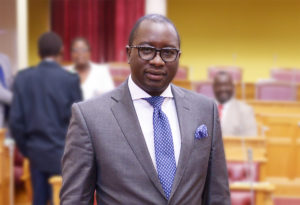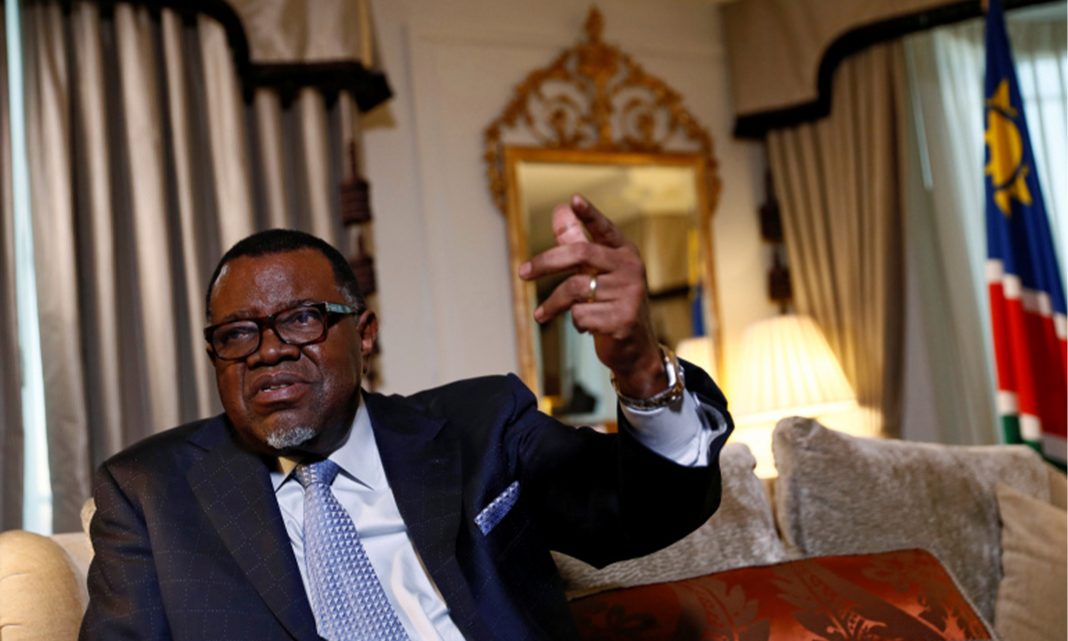By Shinovene Immanuel | 6 April 2021
DOCUMENTS submitted to the Anti-Corruption Commission (ACC) show how former minister of justice Sacky Shanghala instructed a Fishrot lawyer to fund Swapo politicians and president Hage Geingob’s party campaigns.
Some of these details, contained in emails and bank statements, which have not been reported on in the media in detail in the past, are included in the attachments to an affidavit provided by lawyer Marén de Klerk to the ACC last year.
De Klerk’s affidavit was allegedly leaked to disadvantage his state witness chances.
Funds were paid from Celax Investments Number One – a company that was allegedly controlled by Swapo proxies to launder funds from a government-owned fishing company.
The media has since last year reported on Celax Investments as an entity controlled by De Klerk, but its role was not clear.
An investigation by the Organised Crime and Corruption Reporting Project (OCCRP) and The Namibian found that Celax was set up to specifically fund Geingob’s Swapo campaign.
Al Jazeera co-published that investigation last week.
Geingob’s spokesperson denied the allegations, calling the president’s record on fighting corruption “unblemished”, but declined to comment in detail as the information is part of an ongoing court case.
“At no point did the president instruct or ask someone to engage in fraudulent activities,” presidential spokesperson Alfredo Hengari said in an email.
Swapo’s spokesperson and deputy minister of defence and veterans’ affairs, Hilma Nicanor, did not respond to repeated attempts for comment.
INSTRUCTIONS
The Namibian has no additional evidence that Geingob instructed Shanghala to fund his campaign.

Geingob’s supporters say Shanghala and Hatuikulipi abused the president’s name for their benefit.
However, bank records and emails show that the former justice minister called the shots on some payments towards Geingob’s party campaign.
For instance, at around 01h00 on 17 August 2017, Shanghala instructed De Klerk to make several payments to Swapo-related companies, regional offices and individuals.
“As agreed, there should be a N$5 000 subsistence and travel (allowance) for the band [the Ndilimani Cultural Troupe].
“They will be departing for Katima Mulilo to perform at the Swapo Party Youth League (SPYL) congress there,” Shanghala said in an email – a few months before the Swapo congress.
He added: “Could you therefore release the N$75 000 for the 15 staff members, please? We should also release the N$50 000 for their logistics.
“As they leave tomorrow, the sooner the better. My apologies for the delay. The total is N$120 000,” the former minister said.
A few days later, he also instructed the lawyer to pay N$85 000 that was shared between the then acting SPYL secretary Veicco Nekundi (N$65 000) and Ephraim Nekongo (N$20 000) who was to take over the Swapo youth league’s leadership a few weeks later.
Nekongo and Nekundi have denied any wrongdoing in the past.
Another beneficiary was the Ndilimani Cultural Troupe’s manager, Jesse Nombanza, whose vehicle loan in 2017 of around N$443 000 was paid by De Klerk.
Ndilimani Cultural Troupe member Joseph Gabriel, known as ‘Matangara’ in Swapo circles, was paid N$150 000 on 19 December 2017.
CAPE TOWN MEETING
The 2017 payments were born out of an alleged scheme that started in 2016. A few days after Christmas in 2016, two men met in the VIP area of the Shimmy Beach Club in the swanky waterfront district of Cape Town, in South Africa.

They were allegedly plotting how they could divert state funds to keep Geingob in power.
Gathered at the posh club were Shanghala, then attorney general, and James Hatuikulipi, then chairman of the board of the state-owned National Fishing Corporation of Namibia (Fishcor).
Joining the two was Adriaan Louw, a Namibian businessman with decades of experience in southern Africa’s fishing sector.
There, they formulated the first stages of a scheme that would channel millions of dollars from Namibia’s lucrative fishing industry to Swapo, according to De Klerk.
Private correspondence shows that Shanghala and Hatuikulipi also asked De Klerk to set up a shell company that would become instrumental in Swapo’s alleged fishing scheme: Celax Investments.
The two men would control Celax, even as the lawyer owned it on paper.
Then, in January 2017, Hatuikulipi and Shanghala arranged for Fishcor to go into business with Louw.
Together, the three men formed Seaflower Pelagic Processing, a public-private joint venture between Fishcor and Louw’s company, African Selection Fishing.
Under the original terms of the venture, African Selection Fishing would be the majority shareholder of Seaflower, owning 60%, while Fishcor would own 40%.
The same month Seaflower was set up, in January 2017, Bernhard Esau, then minister of fisheries, awarded Fishcor a licence to catch 50 000 tonnes of horse mackerel per year for 15 years, which it then shared with its new partner, African Selection Fishing, which would in turn run the fishing operation.
At a market rate of US$850 per tonne, this would be worth some US$637 million.
The award was given without a competitive bidding process, violating Namibian laws.
Bank statements, invoices, internal correspondence, and government documents show that top government officials set up several Swapo-controlled companies that received nearly US$4,5 million skimmed from a US$637 million fishing deal between Fishcor and African Selection Fishing.
Some of this money, leaked notes from party officials show, was allegedly then handed to Swapo electors in what appears to have been a vote-buying campaign ahead of the party’s 2017 congress.
Around the time the Seaflower venture was formalised, Celax Investments, the company that would end up siphoning money to pay off the Swapo officials, was secretly brought in as a partner.
Because it was black-owned, Celax was given 25% of African Selection Fishing’s shares in Seaflower to comply with planned ‘empowerment’ legislation.
Louw told OCCRP last week that Celax Investments “was meant as a reserve vehicle” until Namibia’s empowerment laws were passed, and his company had received annual confirmation that it was not active.

He said he had no “benefit or interest in these shares”.
Banking records show that Celax received N$200 000 from ‘Fishcor’, which was used as a reference for the payment on 30 June 2017.
The following day, Shanghala sent De Klerk a list of 17 recipients who had performed services for Swapo and were to receive transfers from the company.
Bank records show that De Klerk made more than 37 payments to 18 companies and individuals on behalf of Celax, totalling some N$58 million between July 2017 and November 2018.
On 4 August 2017, De Klerk received a deposit of N$14 million in his law firm’s trust account from Mermaria Seafood Nam, a local fishing company owned by Samherji, the Icelandic firm at the centre of the Fishrot corruption scandal.
Hatuikulipi instructed the lawyer to send the N$14 million to Celax’s bank accounts a day later.
Esau’s lawyer, Richard Metcalfe, said the former fisheries minister “vehemently denies all allegations against him”.
* This story has been amended to indicate that De Klerk’s affidavit was allegedly illegally leaked to disadvantage his case.






